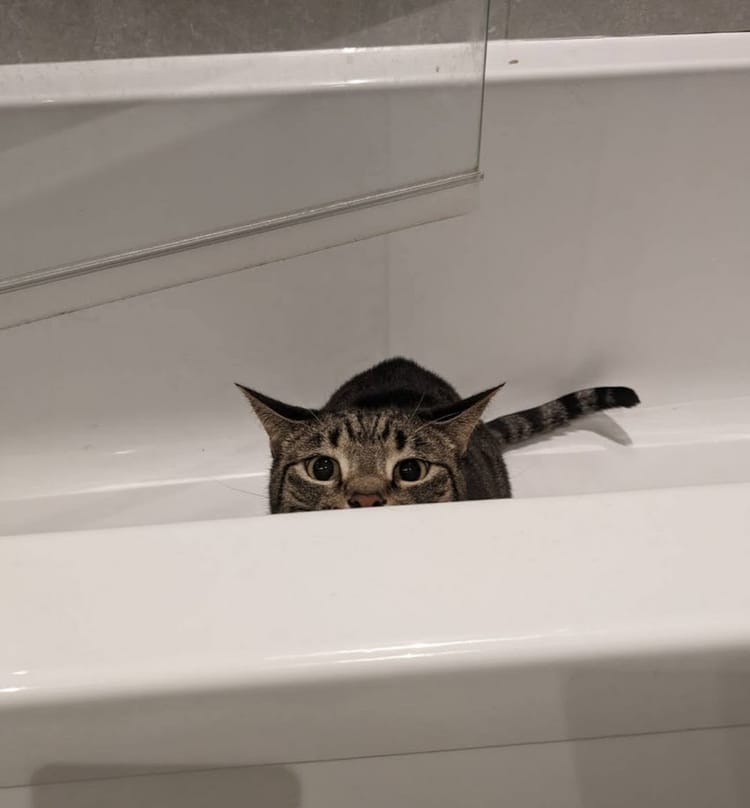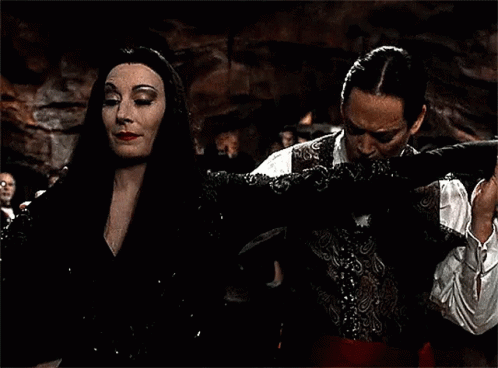Since feeling is first

Happy 2025, loves <3
January is a silly time for resolutions. Here in the northern hemisphere, the weather's no good for anything except eating biscuits on the couch, and shops trying to sell you tiny exercise shorts while it's -1 degrees and dark at 4pm are surely joking. Down south, it's a bloody waste to be tethered to a laptop trying to achieve goals while the world is lovely and birds are singing and flowers and friends are inviting you to dance with them. Absolutely not. The year should begin in March, as it used to, or perhaps September, and consist of thirteen equal months like a reasonable system. January resolutions as a notion are absurd.
No animal, according to the rules of animal-etiquette, is ever expected to do anything strenuous, or heroic, or even moderately active during the off-season of winter. All are sleepy - some actually asleep.Kenneth Grahame, The Wind in the Willows
Yet, I'm a fan of any opportunity to reflect on one's life. I spent some time last week writing a list of my best memories of 2024, and felt overwhelmed by how much I have to be grateful for. But the thing that really defined 2024 for me was a lot of difficult emotional work, i.e. spending a lot of time in therapy UGH. This was all very healthy and yay personal growth and whatever, but also, feelings: eww.
I feel like I've been carrying around an invisible backpack, and last year I sat down and unzipped it and had a long-overdue look at the contents - there was some pretty repulsive curdled muck at the bottom, like when you forget sandwiches at the bottom of your schoolbag and excavate a parcel of soft mould in clingwrap many months later. Excavating the backpack was gross, but I feel much lighter now.
So recently, I've been thinking a lot about feelings, which is a very Sam sentence. I'm distrustful of feelings by nature, far more likely to intellectualise my problems and make lists and action plans than to have a little cry, which is sometimes a much faster route to feeling better. I'd gotten so good at managing emotions I mostly don't notice when I have them. This works very well 99% of the time, except that the 1% of the time the system fails, it fails catastrophically. My emotion-management system failed last year sometime around April, and it's taken me many months to put myself back together.
So, I'm trying to learn to be more curious about my emotions, rather than getting immediately annoyed with them and shoving them into the backpack.
Take rage, for instance. Rage is a foundational emotion. It's the infant's cry, the primal expression of "life has disappointed me". Freud called it the death drive, the motivation for aggression and destruction, as primal as the life drive, which ... draws our eyes towards butts.

All children begin as aggressive little creatures, as anyone who's spent time with a kicking, biting toddler will tell you. Regardless of gender, physical aggression peaks between 2-4, but then diverges as girls learn more quickly than boys to suppress violence (in favour of writing cruel notes about each other and excluding each other from skipping games, in my experience). For many women, rage comes exploding out of the backpack again around perimenopause, uglier than ever from all that time curdling with the sandwiches. Some of it's hormones, probably, and some of it's the impossible burdens lumped onto many middle-aged women's shoulders, but midlife is the moment the lifelong strategies people use to suppress/sublimate/ignore their anger often begin to fail.
And learning to control and redirect our aggression is the foundation of society! Aggression is often (momentarily) satisfying, but often not good, and rage is aggression's cheerleader. We can't forget that the impulse for aggression hides in all of us, just waiting for someone to say, "Yeah, go ahead, that guy totally deserves it." In many parts of the world, we only stopped doing public executions in the 20th century, and huge crowds would watch because it was entertaining. 20,000 people gathered for Rainey Bethea's hanging in 1936 in the USA. As long as we're sure the victim deserves it, violence is fun. Like everyone else, I was gleefully sharing Luigi Mangione memes a few weeks ago. Each of us carries a shard of cruelty in our hearts.

I'm distrustful of rage because it's slippery. That "life has disappointed me" feeling can be an appropriate response to real oppression or violence, but it can just as easily be the tantrum of the privileged experiencing a taste of equality (what Myisha Cherry describes as being angry about our place in the hierarchy, as opposed to being angry that there's a hierarchy at all). The emotion is the same, and actually, when we honestly examine our own angry feelings, we'll probably discover a messy tangle of moral and selfish and healthy and ugly and violent imperatives.
Without rage, we'd probably never be motivated to change anything about our lives or about society. Rage says, "this is not okay!" But rage also closes off our ability to contemplate any competing points of view. Rage traps us in our certainty that we are right. When you're furious about something, are you asking yourself, "is there more context I don't understand?" No, you're fantasising about throwing bedbugs through someone's window, or more directly, punching them in the face.

I'm reading Naomi Klein's superb Doppelganger: A Trip into the Mirror World, which is the book that's finally helping me understand what the heck's going on in American and British politics right now. She describes how the unsettling thing for "the left" about what's happening to "the right" isn't just the degree to which they seem to have bought into absurd conspiracies (e.g. the Covid vaccine is a mind-control agent; or trickle-down economics), but how certain "they" are that "we" are the ones living in clown cuckoo city. And without reverting to simplistic both-sidesism, Klein points out how these narratives about the world increasingly define themselves in opposition to each other, building from the blind spots of the other worldview. Anger shuts down our curiosity about other people's experiences. Rage traps us in our own stories.
“Like my doppelganger projecting all of our surveillance fears on a vaccine app, conspiracy theorists get the facts wrong but often get the feelings right” - Naomi Klein
But just suppressing rage doesn't work. Rage ferments in the backpack. Of the approximately 7,000 psychology books I read this year, my favourite was All the Rage: Why Anger Drives the World by psychoanalyst Josh Cohen. He describes how some people (me) repress anger so effectively, they stop being aware of it entirely. Instead, it sneaks out sideways, showing up as chronic pain, addiction, chronic people-pleasing or self-harm. A friend of mine used to talk about how she’d experienced depression as “anger turned inwards” and believed the flashes of rage she began to experience in her thirties were the parts of herself that refused to allow her to do that any more.
"If you bring forth what is within you, what you bring forth will save you. If you do not bring forth what is within you, what you do not bring forth will destroy you." - The Gospel of Thomas
I've found it helpful to think about emotions as being different to feelings. In this model, emotions are a physical reaction you have in your body; like experiencing anger as clenched fists and a beating heartrate, or experiencing disgust as nausea and cringing. You turn the emotion into feeling when you intellectualise it ("that asshole just bumped into me because he's a jerk, I'm so mad";"that person is disgusting because they're wearing Crocs, eww"). So if we were being pedantic, instead of telling people "your feelings are valid" we would say, "your emotions are valid; but hey, your feelings might be wrong. They're probably at least incomplete."* Feelings are stories, and no story can encompass the whole of the truth.
*(Please don't actually say that to other people, good grief! And let's be especially aware of our tendency to dismiss the subjective accounts of some types of people more quickly than others too, yeah?)
But we can't skip over the emotions are valid part. Emotions are facts, in and of themselves: they're a physical experience, and they're useful signals. We ignore them at our peril. I'm trying to learn to tune into my emotions more, which means practicing mindfulness (my therapist recommends Headspace and Calm, yoga is also good). Tuning into body and mind, letting myself feel what I'm feeling. I hate it! It's the worst! It is, also, annoyingly helpful.
But then we have to go further, and be curious about the feelings, too. Invite ourselves to step out of our own simple stories and interrogate the truth of them. Listening to others. Explore what the emotion might really be telling us. Asking what we are actually being invited to change about our lives or the world.
Not doing this leaves us vulnerable to demagogues who want to give us simple outlets for our emotions, that don't require us doing anything difficult at all. Naomi Klein again:
“Like my doppelganger projecting all of our surveillance fears on a vaccine app, conspiracy theorists get the facts wrong but often get the feelings right ... This might explain why the conspiratorial claims in the Mirror World so often seem to contradict one another. For this new political configuration, convincing people of their unproven theories was never the real point—it was only ever a tool. The point, consciously or not, is to foster denial and avoidance. The point is not to have to do hard and uncomfortable things in the face of hard and uncomfortable realities, whether Covid, or climate change, or the fact that our nations were forged in genocide and have never engaged in a remotely serious process of making repair. Denial is so much easier than looking inward, or backward, or forward; so much easier than change. But denial needs narratives, cover stories, and that is what conspiracy culture is providing.”
Charlie Chaplain's speech from The Great Dictator, a film that feels extremely relevant in our current political moment (Charlie Chaplain was a child rapist, to heck that guy, but this is a great speech nonetheless).
Anyway, so last year I spent a lot of time mucking about in my ugliest feelings. Dancing with my death drive. Boxing with my shadow. It was helpful, but hard.
This year, in place of any pragmatic resolution, I'm hoping to balance this out a bit and direct my energies to the "life drive". I'm calling 2025 my Year of Romance. Not in the simple sense of smooching cuties (although I do intend to do a lot of smooching of one particular cutie, with whom October will be my 10th anniversary). I mean romance in the broader sense, the romance of the everyday, romance as curbing my rationalist bent and trying to celebrate the truth and beauty of raw emotion, romance as vitality, as mystery, connection, art, passion, depth of feeling. Romance, perhaps, as hope.
Basically, channeling this old classic by e e cummings:
since feeling is first
who pays any attention
to the syntax of things
will never wholly kiss you;
wholly to be a fool
while Spring is in the world
my blood approves,
and kisses are a better fate
than wisdom
lady i swear by all flowers. Don’t cry
—the best gesture of my brain is less than
your eyelids’ flutter which says
we are for each other: then
laugh, leaning back in my arms
for life’s not a paragraph
And death i think is no parenthesis
--
What about you, loves? What's the energy you're trying to bring with you into the new year? I'd love to hear about it - just hit reply.
Wishing you kisses, rage rooms, and an unladen backpack,
Sam
--
Feelings resources
- Obviously, therapy can be a great space for exploring your feelings. Therapy's expensive yo, but it's cheaper than having a breakdown. South Africans, The Counselling Hub offers affordable therapy sessions.
- Parents of teenage girls, You Don't Understand Me: The Young Woman's Guide to Life by Tara Porter is a fantastic guide to navigating the emotional storm of those age 13-16 years.
- Contrapoints' video essay "Envy" is one of her finest works about the interplay between our emotions and our political system.
- I cannot overstate how great Naomi Klein's Doppelganger is! It's very US-Canadian-UK-centric, but an insightful and nuanced and important analysis of what the hell's happening over here, politically.
Some other lovely things recently
Between finishing off the latest round of Femme Feral edits (which is very much a novel about the shadow self), it's been cosyville around here. Some random things I've loved recently:
- Baking all the NYTimes Christmas Cookies. I've been especially into these lemon-turmeric crinkle cookies.
- Anna Jones' roast grapes on toast - I eat them with Julienne Bruno Superstraccia, the best best vegan cheese.
- I got to see RaMell Ross discussing his new film Nickel Boys at my fave local indie cinema (the Rio). It's a transcendent film about teenage boys being sent to a racist "reform school" in 1960s in the US, all shot in first-person point of view. It's extraordinary, and I hope you like weeping.
- Londoners, Matthew Bourne's queer Swan Lake is on at Sadler's Wells for just a few more days. It's great! I've been obsessively listening to this Russian State Symphony recording at top volume (thanks Rachel).
- Everyone who responded when I told you I was getting into crochet last year, I've now progressed to knitting, see what you've done, I hope you're happy. Please send me your favourite beginner-friendly patterns, so far all I've managed is a wonky dishcloth.






Member discussion